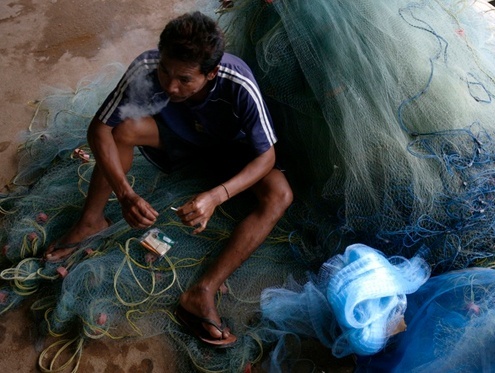The US government has downgraded Thailand in its latest Trafficking in Persons (TIP) report for showing no visible improvements in combating the trafficking of Burmese, Cambodian and Lao workers in various sectors, particularly from the abusive and brutal conditions of its profitable fishing industry.
The report also lambasted the Burmese government and military for subjecting vulnerable communities, such as those living in conflict-prone areas like the Rohingyas, to forced labor and for allowing impunity to powerful individuals alleged to facilitate trafficking.
According to the report, released Friday morning in Washington DC by the US State Department, both Thailand and Burma are engaged in the systematic trafficking of Burmese, Cambodian and Laos men to work on Thai fishing trawlers. Without any legal status, these workers are often tricked or forced into arduous working conditions on these vessels, are threatened and physically beaten, and receive little to no pay.
They are also often held against their will on these vessels with no means of escape from their “employment.”
“Men from Thailand, Burma and Cambodia are forced to work on Thai-flagged fishing boats in Thai and international waters and were rescued from countries including Malaysia, Indonesia, Vietnam and Timor-Lest,” the report said. “Cambodian and Burmese workers are increasingly unwilling to work in the Thai fishing industry due to dangerous and exploitative work conditions which make them more vulnerable to trafficking.”
Particularly at risk are Rohingya asylum seekers who continue to be smuggled from Burma and Bangladesh by corrupt Thai navy, military and government officials, the US alleges.
[related]
“Thai navy and marine officials allegedly… facilitated the transfer of some migrants to smugglers and brokers who sold some Rohingya into forced labor on fishing vessels,” the report said, adding that some Rohingyas have also reportedly been “systematically removed” from Thai detention facilities and sold to smugglers.
Across the porous border, Burma, which remains on the “Tier 2 Watch List” for the third consecutive year – a ranking system that determines how much a country is doing to combat human trafficking – is afflicted with military officials and insurgent armies who engage in the “forced conscription of child soldiers and continue to be the leading perpetrators of other forms of forced labor inside the country”.
In addition, the military and government officials force men, women and children to work as “porters, manual labor for infrastructure project or in state-run agricultural and commercial ventures … particularly in Rakhine [Arakan] State.”
With many Burmese driven to seek jobs outside the country, corrupt government and military officials exacerbate the already harrowing circumstances created by migrant brokers and human trafficking networks who are eager to migrate workers without legal documentation.
“Networks on both sides of the Burma-Thailand border facilitated migration of undocumented workers, which often leads to their being trafficked upon arrival in Thailand,” the report said, adding that corruption and lack of accountability is “pervasive”.
“Police limited investigations when well-connected individuals were alleged to be involved, including in forced labor or sex trafficking cases,” the report said, explaining that the International Labour Organization had alleged the involvement of military wives in sex trafficking cases but there was no prosecution.
Burma, officially known as Myanmar, remains on the “Tier 2 Watch List” for the third consecutive year; it was granted a waiver from a downgrade due to a written plan that could make “significant efforts” towards eliminating the issue. If the government does not visibly improve the situation, it could face a downgrade next year like Thailand, which would introduce economic sanctions.
[pullquote]”Thailand has maintained that it has been making progress and to have their actions judged as not being sufficient will be a blow to them. But it’s already been outed that Thailand has been taking advantage of these migrants systematically and there’s a lot of corruption, a lot of forced labor and a lot of human trafficking that happens here.”[/pullquote]
Thailand has hovered on the “Tier 2 Watch List” since 2011, and its move to Tier 3 this year comes during a particularly tumultuous month. At the end of May, the Thai military declared a coup against the troubled administration of Prime Minister Yingluck Shinawatra following months of protests and political turmoil. Two weeks later, Guardian published a six-month investigation into the abuse of migrant workers in fishing vessels, allegedly propagated by Thai government and police officials, to sell fish feed and shrimp linked to major international supermarket chains.
While sanctions usually comes with a Tier 3 ranking, Phil Robertson, deputy director of Human Rights Watch’s Asia division, said that the main issue for Thailand would be the damage to its reputation. Most of the sanctions linked with anti-human trafficking legislation are in terms of development aid, and Thailand does not receive much aid from the US, he said.
“Thailand has maintained that it has been making progress and to have their actions judged as not being sufficient will be a blow to them,” Robertson said. “But it’s already been outed that Thailand has been taking advantage of these migrants systematically and there’s a lot of corruption, a lot of forced labor and a lot of human trafficking that happens here.”
With roughly 2 to 4 million Burmese migrants in Thailand – a vast range that portrays how systemic the problem is – Robertson said that the Thai government need to prosecute the traffickers involved, particularly those in high places, and “end the culture of impunity that exists that allows migrant workers to be treated as less than human.”
Since the coup, raids have been carried out by the Thai military throughout Thailand in the migrant worker communities, and more than 1,000 Burmese migrants have been arrested since 10 June. Upwards of 200,000 Cambodian migrant workers – mostly undocumented – have fled to Cambodia after hearing rumors of a “crackdown” by the Thai military.



